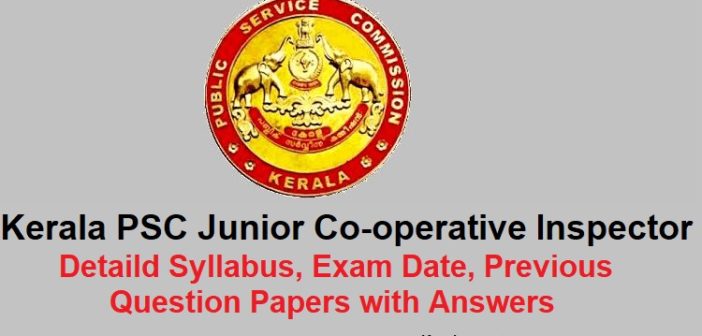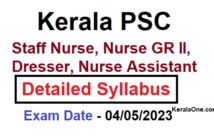Deprecated: Creation of dynamic property InsertPostAds::$settings is deprecated in /home4/keralaon/public_html/wp-content/plugins/insert-post-ads/insert-post-ads.php on line 427
Candidates who are applied for Kerala Public Service Commission recruitment for Junior Co-operative Inspector in Kerala Khadi and Village Industries Board can get all information about Kerala PSC Junior Co-operative Inspector Recruitment 2020. Here we are discussing about Kerala PSC Junior Co-operative Inspector Syllabus, Confirmation date, examination date, Hall ticket availability to download, etc.
Content
- Kerala PSC Junior Co-operative Inspector Recruitment Details
- Junior Co-operative Inspector Detailed Syllabus
- Exam date and Confirmation Date
- Previous Question Paper with Answers
- How to Download Junior Co-operative Inspector Hall Ticket
Kerala PSC Junior Co-operative Inspector Recruitment Details
| Event | Details |
|---|---|
| Post Name | Junior Co-operative Inspector |
| Department | Kerala Khadi and Village Industries Board |
| Organisation | Kerala Public Service Commission |
| Category No | 309/2019 |
| Salary | INR 27800 – 59400/- |
| Last date to apply | 15.01.2020 |
| Official website | https://www.keralapsc.gov.in/ |
| Official Notification | Click Here |
Junior Co-operative Inspector Detailed Syllabus
Kerala PSC will conduct an OMR based test for the post of Junior Co-Operative Inspector in Kerala Khadi and Village Industries Board. Candidates who are already applied for the posts can prepare here using the detailed syllabus for the Kerala PSC Junior Co-operative Inspector exam. Go through the below given Junior Co-operative Inspector syllabus thoroughly.
The Junior Co-operative Inspector exam syllabus contains 3 parts.
- Part I – Co-operation
- Part II – Banking
- Part II – Information Technology and Cyber Laws
The detailed syllabus for KPSC Junior Co-operative Inspector examination is as follows.
Part I – Co-operation
| Part I – Co-operation | |
|---|---|
| Subject | Topics |
| Cooperation and other economic systems- |
Capitalism, socialism and communism cooperatives and other forms of business organizations- distinctive features of cooperative organization vis-à-vis-, partnership and joint stack companies- a cooperative as an institution and as an enterprise- cooperative commonwealth.
|
| Evolution and development of cooperative principles |
principles of cooperationRochdale pioneers (I stage)- reformulated principles by ICA (II – stage)- Karve Committee on Cooperative Principles(III stage)- Principles of ICA in 1995( IV stage)- the distinction between Cooperative values and cooperative principles.
|
| Types of Cooperatives in India and in Kerala |
(i) Short term and medium term cooperative credit structure- primary agricultural credit societies- urban cooperative Banks and state cooperative Banks, (ii) Long term credit structure-PCARDBs and SCRABDs (iii) General Purpose and special purpose agricultural marketing societies- primary marketing societies and their federations including NAFED, rubber marketing societies and their federations, dairy cooperative societies and their federations, fishery cooperatives and their federations (iv) processing cooperatives-need and importance (v)Housing cooperatives and their federations(vi) Consumer cooperatives and their federations (vii) Industrial cooperatives and their federations- handlooms and power looms, coir, handicrafts (viii) Workers cooperatives – significance of workers cooperatives in Kerala.
|
| Management and working of major cooperative organizations and institutions in aid of cooperatives |
NAFED, IFFCO, KRIBCO, NABARD, NDDB, NCDC, and National Housing Bank and other national organizations providing assistance to housing cooperatives.
|
| Cooperative audit |
Definition-objectives-scope-advantage-difference between audit of cooperative societies and joint-stock companies- special features of cooperative audit administrative set up for cooperative audit-types of audit-mechanical audit-preparations for audit and framing of audit programme-staged of practical audit- mechanical audit, administrative audit, preparation of final statement- reconciliation of bank account cooperative auditor- duties, powers and liabilities- audit report- audit certificate- audit classification- assessment and levy of audit fees.
|
| Issues in cooperative management |
Managing the social process in a cooperative, competition, conflict and cooperation. Associative character of a cooperative and managing a cooperative association. Issues in organizing a cooperative – the size of the organization- small area vs large area, single-purpose vs multipurpose cooperative multipurpose vs multifunctional cooperatives- unitary vs federal cooperatives- designer vs greenhouse cooperatives- issues in financing a cooperative- evaluating a cooperative organization- member dimension, enterprise dimension and ethical dimension.
|
| Settlement of disputes |
arbitration and awards- provisions and procedures- execution and enforcement of awards- provisions and procedures, appeals, review and revision meaning and distinction- the authority of appeals- cooperative tribunal- constitution and powers- offences and penalties- provisions and procedures.
|
| Sources of funds |
State aid to cooperatives-share capital contribution- principle state partnership fund- subsidiary state partnership fund- grants- subsidies- owned funds borrowed funds.
|
| Cooperative Legislation in India and in Kerala |
Evolution of cooperative legislation in India- the 1904 Act, the Act of 1912, transfer of cooperation as provincial subject, National development Council Resolution 1956, the Model Cooperative Societies Bill 1957, the Model Cooperative Societies Bill 1991 by Planning Commission- Trend towards parallel Cooperative Laws- Andhra Pradesh Mutually Aided Cooperative Societies Act 1995, Multi-State Cooperative Societies Act 1984 and its replacement in 2002.Evolutions of Cooperative legislation in Kerala and enactment of Kerala Cooperative Societies Act 1969.
|
Want to Know Kerala PSC Syllabus 2020?
Part II – Banking
| Part II – Banking | |
|---|---|
| Subject | Topics |
| Commercial Banking |
Origin of the word ‘Bank’. Commercial banking system: Unit banking, branch banking, correspondent banking, group banking/ holding company banking, chain banking, mixed banking. Functions of a commercial bank: Primary functions – Accepting of deposits – different types of deposits – savings deposits, current deposits, fixed deposits, recurring deposits, Basic Savings Bank Deposit Account (BSBDA), Current Account Savings Account (CASA), certificate of deposits; Lending of funds – different methods – direct loans, cash credit, overdraft, discounting of bills; Ancillary Services / Subsidiary Functions: Agency services, general utility services. Principles of commercial banking/ Principles of lending. Credit creation by commercial banks: primary deposits and derived deposits, the technique of credit creation, credit contraction, limitations of credit creation.
|
| Central Banking |
Definition of a central bank, origin of Reserve Bank of India, nationalisation of RBI, functions of RBI – issue of currency, principles and systems of note – issue, RBI as currency authority; RBI as banker, agent, advisor and debt manager to Government, RBI’s financial assistance to Central and State Governments – ways and means advances, overdraft; central bank as bankers’ bank -regulation and supervision of banks by RBI; Reserve Bank as custodian of foreign exchange reserves of the country; developmental role of RBI; Instruments of Monetary Policy: Quantitative techniques of credit control – Bank Rate Policy, operation and limitations of Bank Rate Policy, Open Market Operations (OMO) – objectives, method of operation by RBI, limitations of OMO, Variable Reserve Requirement – Cash Reserve Ratio (CRR) and Statutory Liquidity Ratio (SLR); Qualitative methods of credit control- regulation of consumer credit, variation of margin requirements, moral suasion, rationing of credit.
|
| Indian Commercial Banking- Pre- Liberalisation period: |
Formation of Imperial Bank of India, Origin of State Bank of India and its associates, merging of associate banks with SBI. Social Control over banks – circumstances leading to social control, aims and objectives of the National Credit Council. Nationalisation of commercial banks. Lead Bank Scheme: Objectives, functions of Lead Bank, District Credit Plan. Concept of Service Area Approach. Differential Rate of Interest Scheme – features of the scheme. Regional Rural Banks – objectives, capital structure and management, problems and progress of RRBs, merging of RRBs.
|
| Indian Commercial Banking – Post Liberalisation |
Post-liberalisation banking in India – major recommendations of the Narasimham Committee on Financial System, Narasimham Committee on Banking Sector Reforms. The entry of new generation banks. Mergers and acquisitions in the banking sector. Local Area Banks: Features. Differentiated banks: Payment Banks and Small Finance Banks – permitted business. Financial Inclusion: Concept, RBI and NABARD initiatives for financial inclusion.
|
| Banking Legislation in India |
Banking Regulation Act, 1949 with latest amendments – objectives, definition of banking, banking company, approved securities, Demand and Time Liabilities (DTL), permitted and prohibited business of a banking company, regulation of voting rights of shareholders, restriction as to payment of dividend, reserve fund, licensing of banking companies, power of inspection, audit of bank accounts, acquisition of banking companies, amalgamation of banking companies, winding up of a banking company
|
| Practices of Banking |
Banker and Customer – general and special relationship between a banker and customer, obligations of banker – honouring of cheques, maintaining secrecy of customers’ accounts, garnishee order, consequences of wrongful dishonour of cheques, stop payment of cheques; rights of a banker- right of general lien, right of set-off, banker’s right of appropriation (Clayton’s rule). Banking Ombudsman – objectives, nature of complaints dealt by Ombudsman. Types of customers – operation and closing of different types of bank accounts, special types of bank customers, Accounts of Non-Resident Indians; Joint accounts, accounts of partnership firms, joint-stock companies, clubs and associations.
|
| Law relating to Negotiable Instruments |
Characteristics of negotiability, types and features of negotiable instruments – bill of exchange, promissory notes and cheques. Bank drafts, pay orders. Endorsement of negotiable instruments – legal significance, kinds of endorsements. The crossing of cheques – the significance of crossing, types of crossing, marking of cheques. Collecting banker – legal status, statutory protection, duties. Paying Banker – dishonour of cheques, statutory protection, payment in due course, holder and holder in due course. Modes of charging securities – lien, pledge, hypothecation, mortgage – kinds of mortgage; Guarantee and indemnity – rights and duties of the guarantor.
|
| Agriculture and Micro Finance by banks |
Types of agricultural credit – short term, medium term, long term, crop loans; Kisan Credit Card (KCC) Scheme – Objectives/ purpose, eligibility, features. Lending to priority sectors – categories, targets and sub-targets. National Bank for Agriculture and Rural Development (NABARD) – financial, developmental and supervisory role. Microfinance – concept and significance, Linking of Self Help Groups (SHG) and banks.
|
| Technological Advances in Banking |
Payment and Settlement System of RBI – Concepts of electronic banking, Electronic Clearing Services (ECS), Real Time Gross Settlement (RTGS), National Electronic Funds Transfer (NEFT), Immediate Payment Service (IMPS), Indian Financial System Code (IFSC), Automated Teller Machine (ATM) card, debit card, credit card, RuPay card, internet banking, mobile banking, digital banking, digital signature, digital certificate, digital wallet, Cash Deposit Machine (CDM), Cheque Truncation System (CTS), cashless payment system, cashless economy; International Payment System – Society for Worldwide Interbank Financial Telecommunication (SWIFT).
|
| Recent Trends in Indian Banking |
Credit Rating of banks: CAMELS Rating. Capital Adequacy Ratio – Tier I & Tier II capital, Risk-Weighted Assets, Capital to Risk-Weighted Assets Ratio (CRAR). Non-Performing Assets (NPA) of banks – Classification of Standard, Substandard, doubtful and loss assets, provisioning for NPAs. Concepts of Securitisation, Reconstruction and Security Interest Enforcement under SARFAESI Act, 2002. Pradhan Mantri Social Security Schemes implemented through banks – Rules for Pradhan Mantri Suraksha Bima Yojana (PMSBY), Pradhan Mantri Jeevan Jyoti Bima Yojana (PMJJBY)’ Atal Pension Yojana (APY).
|
Junior Co-operative Inspector Exam date and Confirmation date
The Kerala PSC has published the Junior Co-operative Inspector Confirmation date in Calendar for Submitting Confirmation for the Month April 2020. Candidates who applied for the Junior Co-operative inspector vacancies need to submit the confirmation to write the written examination conducted by the Kerala Public Service Commission. Candidates who fail to submit the confirmation are not eligible to attend the written examination. Only the candidate who successfully submits the confirmation to generate the hall ticket is eligible to attend the respective examination. The Kerala PSC published the Examination date for the Kerala Khadi and Village Industries Board Junior Co-operative Inspector Exam. To view the Examination date, time and venue for the Junior Co-operative Inspector Exam click here – Kerala PSC Exam Calendar April 2020.
Want to Know KPSC Confirmation Procedure in Malayalam
Junior Co-operative Inspector Previous Question Paper with Answers
Candidates can prepare for Kerala PSC Junior Co-operative Inspector examination using the previous year Question papers and Answers. Download the Junior Inspector previous question paper with answers here.
How to Download Junior Co-operative Inspector Hall Ticket
Candidates who successfully submit their confirmation can download the Admission Tickets from 15/04/2020 through their One Time Registration Profile in the KPSC website www.keralapsc.gov.in. Only candidates who submit the confirmation successfully can download the Admission ticket online. To download Kerala PSC Junior Co-operative Inspector Hall Ticket – Click Here




